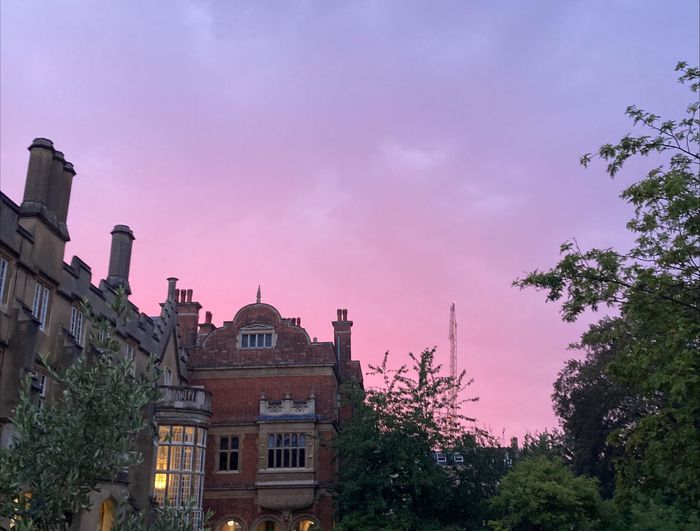Can Cambridge get International Women’s Day right?
Celebrating International Women’s Day must not blind us to the ongoing misogyny at Cambridge, warns Alice Mainwood

I’m not sure what the best way to celebrate International Women’s Day in a place like Cambridge is. But, as I looked around at Caius’ International Women’s Day formal, I was bowled over by the feeling, so reminiscent of fresher’s week, that this traditionalism really isn’t normal. The gowns and the high table, having a candlelit dinner, and standing for a Latin grace at the sound of the gong. Every part of that tradition has existed in Cambridge longer than women have.
The menu was adorned with hilarious puns about ‘squash (ing misogyny) tagine’, ’mushroom paté (on the back for all the Feminists out there)’, and most horrifically, ’roasted parsnip (slips)’. I might have been able to stop taking myself so painfully seriously and just have a little giggle about this, but the high table was dominated by male fellows. Granted, I am always glad to see men in positions of power celebrate the achievements and progress of the Feminist movement, but I couldn’t help but wonder why it was that female fellows didn’t feel motivated to come and celebrate with us. Maybe it was just a sad coincidence. Still, I decided I was within my rights to take myself seriously. Women were admitted to Caius for the first time in 1979: that’s not even 45 years ago. Forgive me, but I don’t think it’s time to joke about International Women’s Day yet.
“Forgive me, but I don’t think it’s time to joke about International Women’s Day yet”
Women have only been studying in Cambridge since 1869. That seems like a long time ago, until you remember that this university was founded in 1209. It only took 660 years. What really makes my heart ache, though, is that we’ve only just passed the 75-year anniversary of women receiving actual degrees from Cambridge. That’s 79 years women have spent studying here, only to leave with no degree, and 75 years that women have spent being graced with an actual certificate at the end of their time here. When I graduate, we still won’t have rebalanced those timelines. I find myself thinking about those women, who left here with no degree to show for it, an awful lot. I feel angry for them. We should hold tight to that bitterness when remembering that these first women were confined to Girton, held at a physical distance to retain the propriety and status of the inner city as a masculine educational institution.
Of course, an awful lot has changed since then. At times, the misogynist tradition that continues to tarnish these ancient institutions can be very quiet indeed. I’ve been relatively lucky with my experience studying here; I’ve never felt restrained or discouraged by academic staff because of my gender, and I do, in spite of myself, feel exceptionally lucky for that. I know I am lucky, though, because the demoralising stories from my female friends studying STEM testify that misogyny is far less muted in more male-dominated fields here.
Sexism is a constant companion for women in STEM in Cambridge, and the trend continues in medical settings too. In November, we reported on Cambridge’s University Hospital being staffed by “bigots and sexists”. It goes beyond Cambridge’s scientific scene, too. Misogyny pervades the Union, the Blues, college choirs, and even academic attainment in Cambridge.
“We do deserve to call out misogyny when we feel it, but we also deserve the time and space to reject the very premise that we must go about this work”
Last year, in a Varsity feature on the history of women in journalism, Isabel Dempsey argued that “we deserve to be acknowledged, respected, and valued”, as we go about “slowly but surely claiming male dominated spaces from the inside”. We do. But we aren’t on equal ground yet. Hence my frustrations with the superficiality of my International Women’s Day formal, which I felt acutely marked the ongoing flaws that continue to pervade Cambridge.
Before I arrived in Cambridge, I had never been the only woman in a room, let alone a busy one. I have been now. Lots of us have been the only woman, and lots of us have also been made to feel that there are spaces we’re not welcome. The old tropes have gone nowhere: we’re not beyond a Cambridge where I hold back from truly expressing myself for fear of being labelled as ‘over-emotional’, nor where I can happily walk home alone after dark. In public and private - in supervisions and in crossing Parker’s Piece after 9pm - the differing treatments persist. We do deserve to say this out loud when we feel it, but we also deserve the time and space to reject the very premise that we must go about this work.
If you, like me, suffered the annual plight of hearing a man ask, “when’s International Men’s day?” (it’s the 19th of November) on a day specifically marked to note the progress of a Feminist movement, know that your dismay is not unanswered. Be it International Women’s Day or not, the Cambridge we occupy is far from equal.
 Comment / Cambridge’s tourism risks commodifying students18 April 2025
Comment / Cambridge’s tourism risks commodifying students18 April 2025 News / Cambridge student numbers fall amid nationwide decline14 April 2025
News / Cambridge student numbers fall amid nationwide decline14 April 2025 News / Greenwich House occupiers miss deadline to respond to University legal action15 April 2025
News / Greenwich House occupiers miss deadline to respond to University legal action15 April 2025 Comment / The Cambridge workload prioritises quantity over quality 16 April 2025
Comment / The Cambridge workload prioritises quantity over quality 16 April 2025 News / Varsity ChatGPT survey17 April 2025
News / Varsity ChatGPT survey17 April 2025





